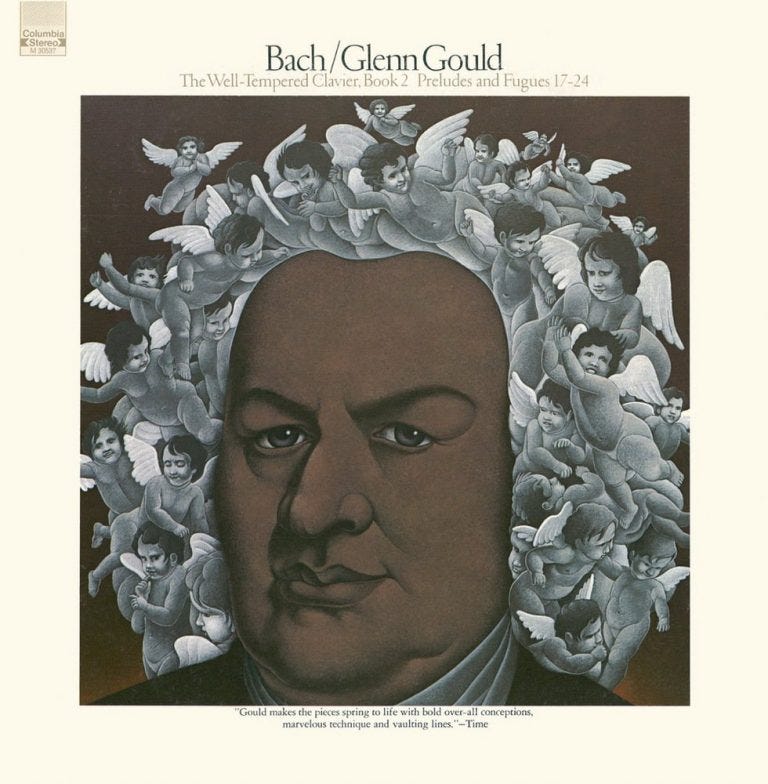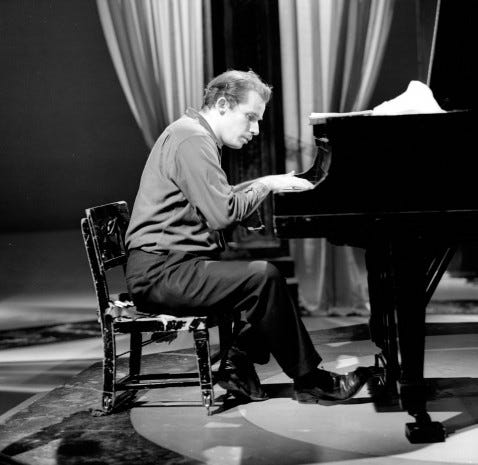October 21: The Well-Tempered Clavier, Book 2; Glenn Gould, piano (and vocals)
We need to talk about Glenn
Like many of you, my door to Bach was held open by the eccentric Canadian genius Glenn Gould. The popular consensus was that Gould was the standard bearer for all things Bach on keyboards, so my natural first purchases were his Goldbergs and Well Tempered Claviers. I liked these exceptionally dry, precise, and driving performances, and for years I felt no need to explore any others.
As my ears, wallet, and CD collection expanded after college, I bought Gould’s recording of intermezzi by Brahms. This was not a good record! Gould clonks around, almost willfully refusing to let the phrases sing. I gave him a pass—maybe Glenn just wasn’t well suited to the lovesick Austrian.
Pressing my luck, I ordered Gould’s Mozart sonatas, and I soon discovered that you can get angry listening to Mozart. Gould so clearly hates the music. Which is fine, but then don’t make the records!
Here are bits of two of the most famous movements in the piano repertoire.
Gould’s opening of Sonata #8 in A Minor:
(Compare to Mitzuko Uchida):
And Gould’s Adagio of Sonata #16 in C Major:
(Compare to Vikingur Olafsson):
GTFO, man. Glenn Gould is an asshole, I thought, and I put all of his albums on ice for a while.
Through Richter, Argerich, Till Fellner, and others, I learned how different, how un-Gould, Bach could sound on piano — unnerving, warm, even sensuous.
I’m not the first person with these complaints. Here’s Leonard Bernstein, speaking to his New York Philharmonic audience, half-disclaiming a performance he was about to give:
You are about to hear a rather, shall we say, unorthodox performance of the Brahms D-minor Concerto, a performance distinctly different from any I’ve ever heard, or even dreamt of... I cannot say I am in total agreement with Mr. Gould’s conception, and this raises the interesting question: “What am I doing conducting it?” I’m conducting it because Mr. Gould is so valid and serious an artist that I must take seriously anything he conceives in good faith...
Sure, but was it good faith for Glenn to try and kick the stool out from under Jamie Laredo in this duet?:
Years pass, as they do, and my bile has subsided — a nice and surprising development in my middle age. (Is this maturity?) Recently, I took Ethan Iverson’s recommendation to check out Gould’s recording of English Renaissance keyboard works by William Byrd and Orlando Gibbons. What a revelation — it’s sensitive and gentle, magnificent and subdued, a beautiful album that put me under Glenn’s spell all over again.
Reappraising him again ahead of this post, I still find so much absolute blazing brilliance in Gould’s playing, especially on the celebrated early Goldberg recording. And at least he’s taking chances! How many boring ass concerts have I been to in my life, where nothing happens, some guy just playing notes in time without anything to say about the music.
The greatest artists take the biggest swings. It’s almost suspect when there are no duds in the catalogue raisonné, and the process of artistic creation might mean we don’t get the great tracks without the stinkers. “Piggies” is still a Beatles song, for better or worse!
Gould is an Al Pacino type character — a big and singular presence, prone to overdoing it, cutting and wild and daring and always completely his own self. We’re lucky to have his Mozart and Brahms to not listen to.
Listen to Gould’s WTC and make up your own minds. Or be of several minds, like me! The frustration is perhaps the point. I’ll feature my highlights of Book II (BWV 870-893) chronologically:
The C# minor prelude starts a little too hokey-pokey for me:
But in the C# minor fugue, Gould is at his most exciting again:
Love these little zips in the D minor prelude (0:03 and 0:06):
With accents not indicated in the score, Gould turns the beat around in the D sharp minor prelude, so great:
Gould starts the E minor prelude with a pistol:
I keenly dislike Gould’s staccato triplets in the F# minor prelude:
The G major prelude is all birds and sunshine, and it’s nearly out of control in the best ways:
The key of A minor has no sharps or flats, so Bach has some fun with it by writing the A Minor Prelude as the most chromatic and weird piece in the collection. A fitting place for us to end today:
Bonus Bach:
YoB mascot Vikingur Olafssohn has released a new EP featuring Bach cantata arrangements for piano. Essential listening.







The Gould Mozart is amazing only because he managed to record the actual sound of contempt oozing out of his veins. In a world where I can listen to Vikingur O., my motivation to give Glenn Gould another listen definitely flags . . .
I generally suck at assessing different interpretations of pieces, so I need much more listening experience with both WTC books before I can make an independent judge on Gould's playing. I enjoyed your narrative, with all stages of 'discovery' included: awe to disgust to accepting ambivalence. Gould's Mozart interpretations, on the other hand, produced nothing in me but shock on listening to your soundbytes. Chris, on listening 'blind', guessed the composer was Rachmaninoff. If I hadn't known these pieces, I would probably have said the same. Horrendous interpretations that do not serve the music or style! PS - I laughed at your title "Glenn Gould, piano (and vocals)".